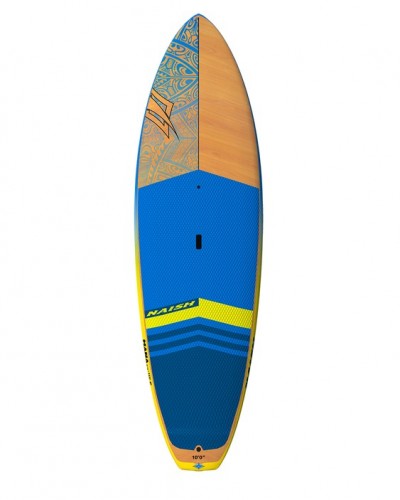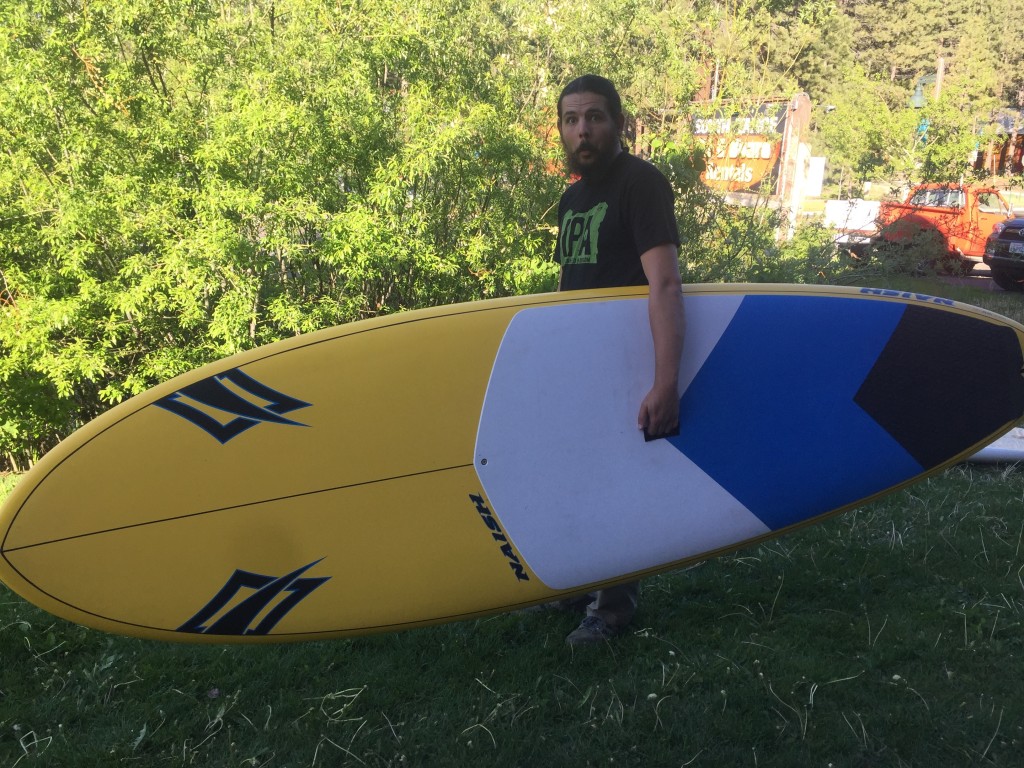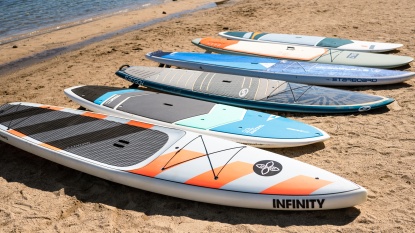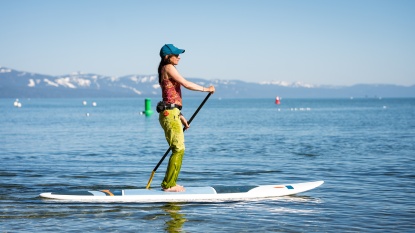Naish Mana GS Review
Our Verdict
Our Analysis and Test Results
Hands-On Review of the Mana
The Mana was relatively unimpressive across the board. This board gave a decent performance overall, falling a little short in terms of gliding but making up for it in maneuverability. All in all, it shows that this board's design is heavily focused towards surfing, to the detriment of its general paddling performance.
To evaluate stand up paddle boards, we conducted extensive research to select the top models, then bought all of them to test side-by-side. We scored each board form 0-100, basing this score on their performance in our five weighted rating metrics. These were Durability, Glide Performance, Maneuverability, and Ease of Transport. The following sections detail exactly how the Naish Mana did — where it excelled, as well as where it got swamped.
Glide Performance
By far the most significant rating metric in our entire testing process, this metric takes credit for 35% of the final score for each product. The Naish delivered a lackluster performance, earning a 4 out of 10. We based this score on the results of a time trial and a distance per paddle stroke test, conducted in both calm and choppy conditions.
The Mana scored in the middle of the pack for the calm water time trial test, hitting an average time of 75.67 seconds. This put it in fifth place overall, finishing about 10 seconds slower than the fastest board, the Saber. The Naish performed relatively similar on the rough water version of this test, once again finishing in fifth overall, but this time only trailing the Surftech Saber by about seven seconds with its time of 114.94.
For our glide per paddle stroke test, the Naish once again finished in the lower half of the pack. This test was designed to assess the efficiency of each board, seeing how far you traveled off of the effort for one paddle stroke. For the flat water test, it took an average of 47 paddle strokes to cross out test course — about ten more than the top performing board in this test, the Saber. The performance of the Naish dropped in the rough water version of this test, finishing in the second to last position. This board took 30 paddles to complete the course, about eight more than the top performing model, the BIC Ace -Tec.
Stability
Our stability metric encompassed three separate tests: handling in rough water, transporting extra weight, and how stable each board was for a beginning paddler. The Mana did fairly well in this metric, worth 25% of the overall score. Scoring a 6 out of 10 for its above-average performance, the Naish was decently stable.
For the first test, we compared how each board handled in rough water. It was about average at handling in rough water, handling most waves and wakes without knocking our testers off. This board is a little on the small side, meaning it's not the best suited for transporting extra passengers or tons of cargo. However, the Naish was still better at transporting cargo than the California Board Company, the Raven, and the Saber.
Finally, this board was about in the middle in terms of beginner preferences. It wasn't the favorite of any of the novice paddlers, but no one complained about using this one — once they found the correct footing.
Maneuverability
Comprising 15% of the overall score, our Maneuverability metric consisted of two tests. These were a time trial through a slalom course made with buoys and a U-turn test. The Naish once again scored a 6 out of 10, for its reasonably above average performance.
The Naish didn't impress us in the slalom course, putting up a time of 94.83 — the third-slowest time of the group. This board maneuvered around the buoys well but just didn't have the speed that other models in the group had. This model did redeem itself in our U-turn test, having one of the smallest turning radii of the group. The triple fin setup substantially helps this board carve, allowing it to complete relatively tight turns without back paddling.
Ease of Transport
Moving out of the water, our final two metrics evaluated and assessed the performance of each stand up paddle board on land. Our Ease of Transport metric accounted for 15% of the total score, with the Naish performing decently well, earning a 6 out of 10 for its efforts. To score the boards for this metric, we compared their weight, the difficulty in loading on a car and carrying, as well as the general ergonomics of the handle. The Naish is one of the lightest boards of the group, weighing in at 26 lbs, 8 oz. This board is relatively easy to load on a car — something that definitely could be accomplished by a single person.
This model is also quite easy to carry and isn't too bad to move, significantly helped by its shorter length. This board has an internal recessed handle that was relatively comfortable and ergonomic.
Durability
For the final metric in our review, we rated the Durability of each board. To assign scores for this metric — accounting for 10% of the total score — we conducted two distinct tests. The first was to perform a thorough evaluation of each board, carefully examining them for any damage sustained during our review. Second, we combed through all of the online forums and user reviews that we could find, looking for any common patterns of damage or issues. The Naish scored about average, earning a 5 out of 10 for its performance in this set of tests. This model had some scratches in the paint and a few scuffs on the side, but no other damage. We also didn't find any recurring issues noted online.
Best Applications
This short and surfy SUP is nimble and maneuverable — it is one of the few boards of the group that we would actually consider trying to surf on. It responds well to shifts in your body weight, but it isn't the best bet for larger paddlers. The Naish Mana GS is a bit of a niche board so we wouldn't recommend it for everyone but it's a solid option for anyone that regularly encounters waves in their SUP excursions.
Value
This board isn't a great value, scoring poorly and having one of the highest list prices of the group.
Conclusion
The Naish is a decent board — designed for primarily surfing — and is relatively stable and is moderately maneuverable. However, this board lacks the general performance and appeal to win an award and is exceptionally expensive. It's a good choice if you plan on surfing your board all the time, but that's about it.










